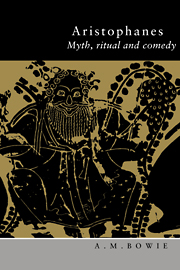Summary
Because of its similarities of subject matter and treatment shared with Lysistrata and Thesmophoriazusae, Ecclesiazusae can be treated at rather less length than the other plays we have looked at. It begins in a manner very similar to Lysistrata. A single woman is on stage complaining that her friends have not appeared as promised; these friends then arrive and we are told the details of the women's unprecedented plot to seize power. Again, because it is early in the morning and the women are gathering, the suggestion is that something odd is afoot. Like Lysistrata and Knights, Ecclesiazusae is structured around festivals concerned with the dissolution and regeneration characteristic of the year-end, and there are again specific references to those festivals; like Thesmophoriazusae, it uses a festival period in which women were permitted greater scope for public activity. There are however differences between Ecclesiazusae and these three other plays. In Knights, the festival sequence leads to a return to the great days of Athens under Miltiades and Aristeides; in Lysistrata, the women's seizure of power is only temporary and brings about the re-establishment of a world at peace but once more controlled by men; and in Thesmophoriazusae the women take matters into their own hands in order to put right a situation which a man has reduced to chaos.
- Type
- Chapter
- Information
- AristophanesMyth, Ritual and Comedy, pp. 254 - 267Publisher: Cambridge University PressPrint publication year: 1993
- 1
- Cited by



